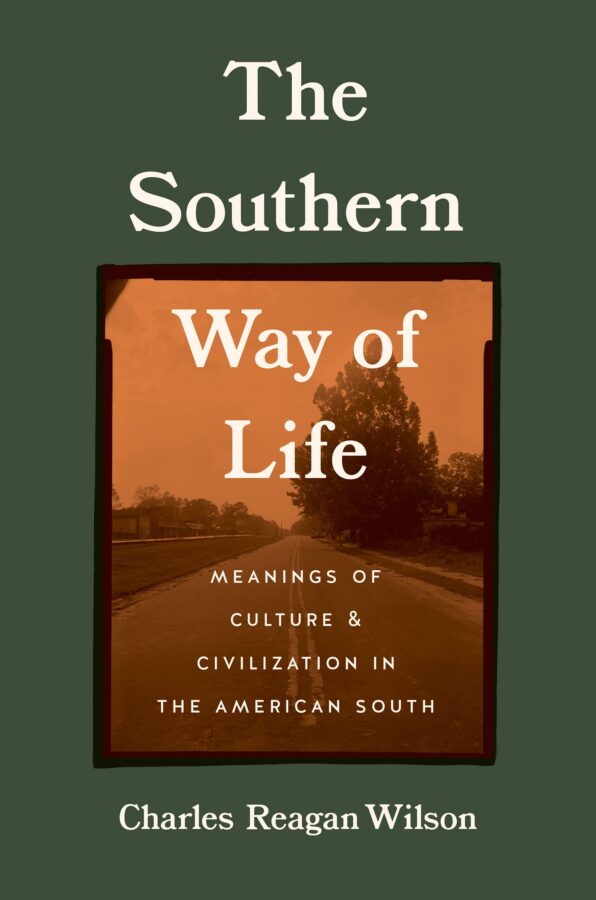The Southern Way of Life: Meanings of Culture and Civilization in the American South by Charles Reagan Wilson. University of North Carolina Press, 2023. Cloth, ISBN: 978-1-4696-6498-9. $39.95.
 This book is a masterful study. Attempting a single-volume history and analysis of “the concepts that reveal an ongoing southern consciousness” (5) from the colonial period through present day is a herculean task. Yet Charles Reagan Wilson is uniquely qualified for the task, and he pours a career’s worth of research, observation, and expertise into the project. Former longtime director of the Center for the Study of Southern Culture at the University of Mississippi, co-editor of the original Encyclopedia of Southern Culture, and general editor of the New Encyclopedia of Southern Culture series, Wilson frames his narrative through a three-part evolution of regional consciousness. He argues that southern consciousness developed through eighteenth- and nineteenth-century contested understandings of “civilization”; shifted after World War I into a “southern way of life,” marked predominantly by agrarian traditionalism and (especially post-World War II) by a defense of white supremacy; and finally transformed around the 1970s into a modern concept of “southern living,” incorporating both multiculturalism and regionally-nostalgic values while still navigating the tensions and conflicts of the South’s historical baggage.
This book is a masterful study. Attempting a single-volume history and analysis of “the concepts that reveal an ongoing southern consciousness” (5) from the colonial period through present day is a herculean task. Yet Charles Reagan Wilson is uniquely qualified for the task, and he pours a career’s worth of research, observation, and expertise into the project. Former longtime director of the Center for the Study of Southern Culture at the University of Mississippi, co-editor of the original Encyclopedia of Southern Culture, and general editor of the New Encyclopedia of Southern Culture series, Wilson frames his narrative through a three-part evolution of regional consciousness. He argues that southern consciousness developed through eighteenth- and nineteenth-century contested understandings of “civilization”; shifted after World War I into a “southern way of life,” marked predominantly by agrarian traditionalism and (especially post-World War II) by a defense of white supremacy; and finally transformed around the 1970s into a modern concept of “southern living,” incorporating both multiculturalism and regionally-nostalgic values while still navigating the tensions and conflicts of the South’s historical baggage.
Part I, “Southern Civilization,” traces the American Southeast from its colonial identity as a provincially distinct region on the margins of mainstream white “civilization.” White southerners battled rhetorically and physically against racial and ethnic minorities as well as regional northern counterparts for autonomy and hegemony. In that process, Wilson contends, the Civil War served as “a contest […] to determine whether the New England version of American civilization or the southern ideal of civilization would dominate” (18). Notwithstanding military defeat and the short-lived experience of Reconstruction, as well as black southerners’ own claims to ideals of civilization, the dominant white South entered the twentieth century with a firmly racialized conception of itself as the apex of western civilization.
Part II, “Southern Way of Life,” explores southern assertions of culture following World War I’s dismantling of prior civilizationist ideals. White agrarian intellectuals failed to stem the tide of industrialism and commercialism, Wilson maintains, but succeeded in framing the South as a traditionalist bulwark of conservative customs and values. This traditionalism survived and outlasted the region’s embrace of New Deal institutional and economic progressivism; it took an increasingly racial form in the face of Black challenges to segregation and antidemocratic policy. In the 1950s and 1960s, then, Wilson posits the white South as once again contending against other parts of the nation, and especially the federal government, over the definitive framework of American culture.
Lastly, Part III, “Southern Living,” surveys the broad reimaginings of southern identity since the 1960s, amid ethnic diversification, economic growth and suburbanization, religious persistence and expansion, and an ethic of consumerism and materialism. This new “multicultural southern living” came to pervade such realms as “music, literature, sports, food, and regional magazines (358), demonstrating the tenacity of southern regional consciousness even in the face of increasing dilution.
Such is the argument of the book, but this review cannot do justice to the sheer breadth and meticulous contextualization of Wilson’s layout of southern cultural history. The narrative flows impressively and beautifully from intellectual historiography to pop-cultural analysis to political biography. Virtually no stone in the panoply of southern culture is left unturned, and few names unmentioned. Wilson seems equally adept and comfortable in his brief analyses of the cultural representations of Outkast and Reese Witherspoon as he is in his magisterial analysis of the Vanderbilt Agrarians or of the competing cultural visions of Booker T. Washington and W.E.B. Du Bois.
The Southern Way of Life is best suited for graduate students, but its impeccable organization and easily manageable categorization provide an excellent opportunity for excerpted readings at the undergraduate level. The book is engaging, enlightening, and deeply relevant—an impressive and fitting accomplishment for Wilson’s already storied career.
Corey J. Markum is Assistant Professor of History at Freed-Hardeman University.
